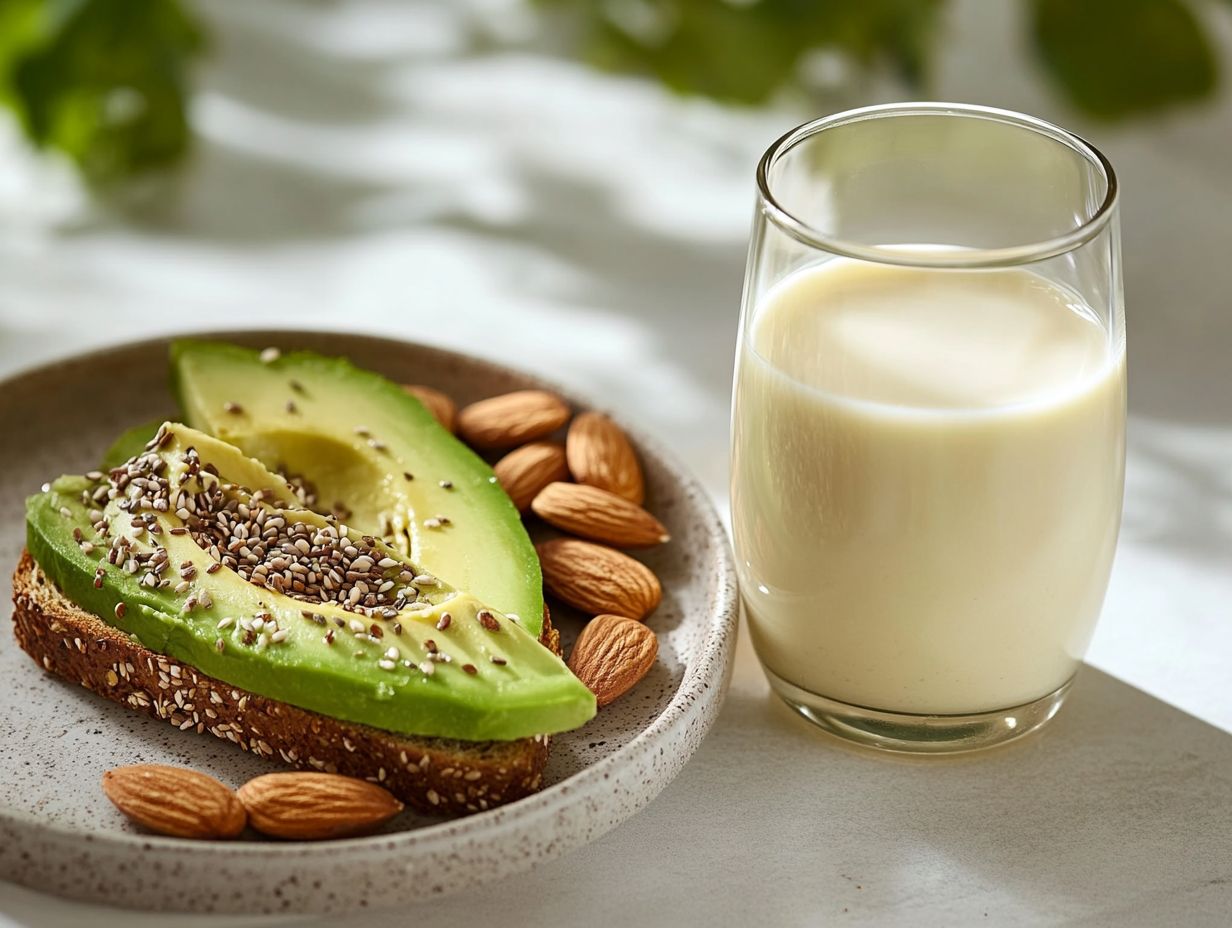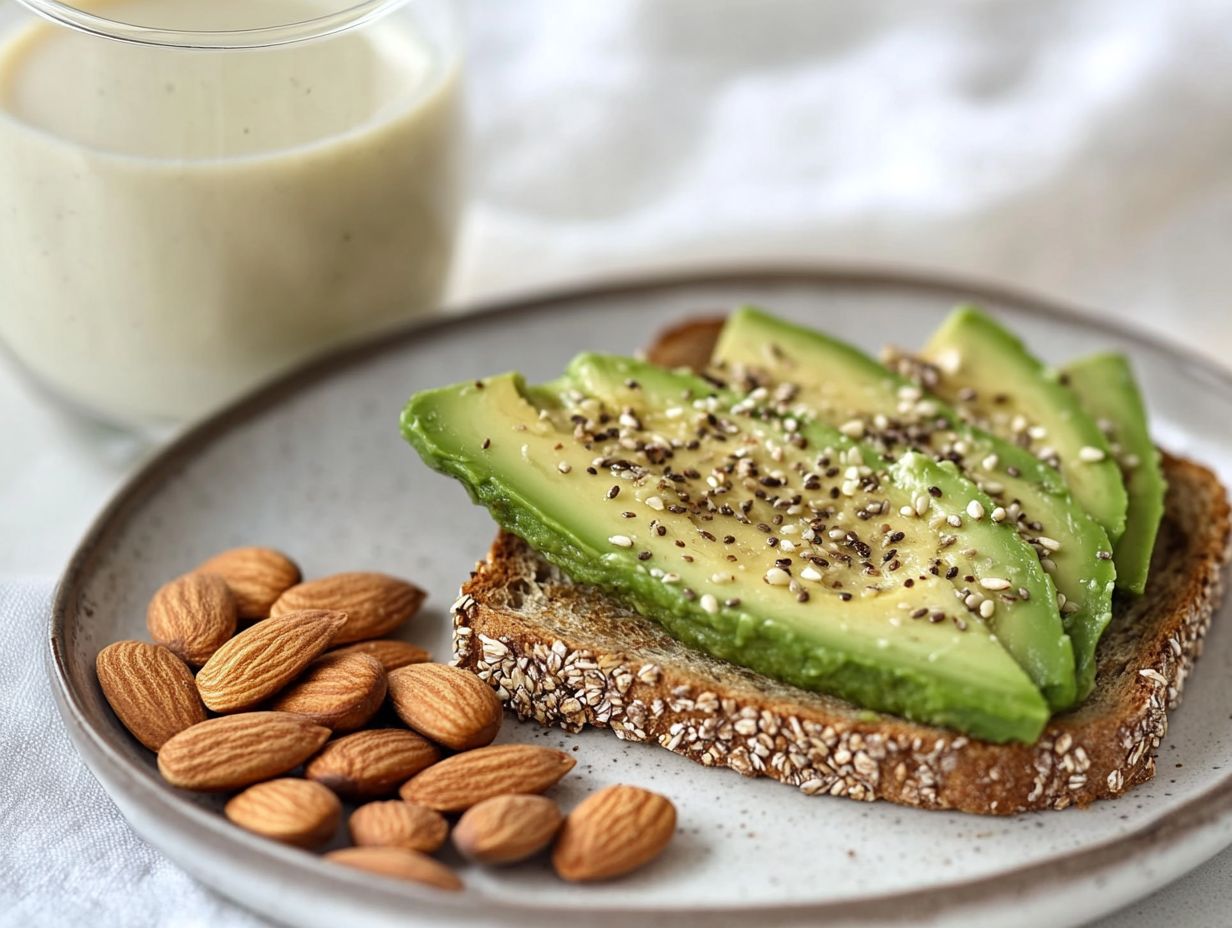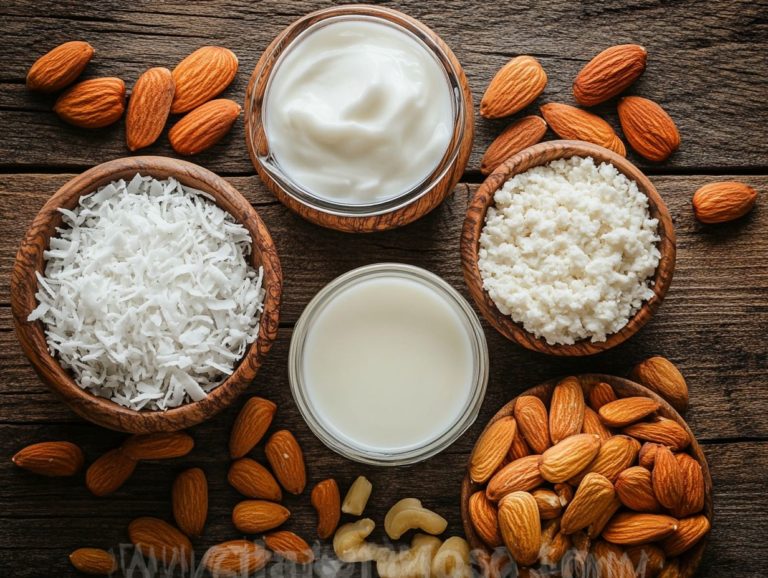Exploring the Benefits of Almond Milk in Keto
Almond milk has emerged as a favored dairy alternative, particularly for those embracing specific dietary lifestyles, such as the keto diet.
But what, exactly, is almond milk? How does it seamlessly integrate into your ketogenic journey? Let s dive into what makes almond milk a fantastic option for your keto diet! This article delves into the distinctive qualities of almond milk, outlines the essential principles of the keto diet, and highlights the myriad benefits this nut-based beverage can provide for keto enthusiasts like yourself.
From understanding its nutrient profile to exploring how it can fit into various keto-friendly recipes, we cover all aspects of integrating almond milk into your diet.
You ll also find guidance on how to weave almond milk into your daily routine, along with a discussion of any potential risks you may encounter, such as added sugars or lactose intolerance. Uncover how this creamy, nutty elixir can elevate your keto experience!
Contents
- Key Takeaways:
- What is Almond Milk?
- Nutritional Benefits
- What is the Keto Diet?
- Benefits of Ketosis
- How Does Almond Milk Fit into the Keto Diet?
- What Are the Benefits of Almond Milk in Keto?
- 3. Rich in Nutrients
- 4. May Aid in Weight Loss
- 5. May Improve Heart Health
- How to Incorporate Almond Milk into a Keto Diet?
- Are There Any Risks or Side Effects of Drinking Almond Milk on Keto?
- Frequently Asked Questions
- What is almond milk and how is it related to the keto diet?
- What are the benefits of including almond milk in a keto diet?
- Does almond milk contain any nutrients?
- Is almond milk a good option for those with dairy allergies or lactose intolerance?
- Can almond milk be used in cooking and baking while following a keto diet?
- Are there any downsides to consuming almond milk on a keto diet?
Key Takeaways:

- Almond milk is a suitable alternative for dairy milk in a keto diet, as it is low in carbs and high in healthy fats.
- The nutrients in almond milk, such as vitamin E and magnesium, may provide added health benefits for those following a keto diet. Almond milk’s low carbohydrate content makes it an excellent choice for maintaining ketosis.
- When choosing almond milk, it is important to check for added sugars and possible allergies to avoid any potential risks or side effects.
What is Almond Milk?
Almond milk, an increasingly popular dairy alternative, presents a delightful option for those seeking a plant-based alternative. Made from ground almonds and water, it boasts a creamy texture and a subtle nutty flavor that many find irresistible.
Often enriched with essential nutrients like calcium and vitamin E, it emerges as a health-conscious choice for individuals looking to reduce their sugar intake. Unsweetened almond milk, in particular, is favored for its minimal sugar content. This makes it a versatile base for a variety of recipes while effortlessly accommodating diverse dietary needs and preferences, including those of keto enthusiasts.
For those who prefer to make their own almond milk at home, homemade almond milk can be tailored to specific dietary needs. This offers a customizable and fresh alternative to store-bought options.
Nutritional Benefits
Almond milk is low in calories and contains healthy fats. It is also a great source of vitamin E, an antioxidant that contributes to skin health and overall wellness.
What is the Keto Diet?
The Keto Diet, or ketogenic diet, is a low-carb, high-fat eating plan that has garnered significant attention for its potential weight loss and health benefits.
By drastically cutting back on carbohydrates and replacing them with healthy fats, you can put your body into a fat-burning mode called ketosis. In this state, your body becomes remarkably efficient at burning fat stores for energy instead of relying on carbohydrates.
This dietary approach not only helps regulate blood glucose levels but also supports a range of health goals you may be aiming to achieve. Consulting with a healthcare professional can provide personalized guidance for your ketogenic journey.
Benefits of Ketosis
Being in ketosis can lead to increased energy levels and improved mental clarity. Many people also experience reduced hunger, which can help with weight management.
How Does Almond Milk Fit into the Keto Diet?
Almond milk is an excellent addition to your keto diet, offering a low-carb alternative to traditional dairy milk that aligns perfectly with your ketogenic eating plan.
The unsweetened variety has minimal carbohydrates, enabling you to indulge in creamy beverages and recipes without the worry of surpassing your daily carb limits. This versatility positions almond milk as a staple that caters to a range of dietary needs and preferences, ensuring you can enjoy your favorite flavors while staying on track.
You can also use almond milk in protein shakes and as a coffee substitute, making it a versatile addition to your low-carb meal plan. Ready to discover the amazing ways almond milk can transform your meals? Let s get started!
Is Almond Milk Keto-Friendly?
Almond milk is indeed a keto-friendly choice, especially when you opt for unsweetened varieties, which usually boast fewer than 1 gram of carbohydrates per cup. This makes it an excellent companion for anyone following a ketogenic diet.
Its low-carb profile allows you to enjoy creamy textures without straying from your dietary goals. This makes almond milk a beloved choice among keto enthusiasts in search of healthier alternatives to traditional dairy products.
When placed alongside other milk alternatives like oat, soy, or cashew milk, almond milk truly shines due to its minimal carbohydrate content. Oat milk, for instance, can pack in as much as 17 grams of carbs per cup, which can throw a wrench in your keto plans.
Almond milk, on the other hand, keeps things light and satisfying. Unsweetened options further enhance its appeal, steering clear of added sugars that could disrupt your state of ketosis.
Incorporating almond milk into your smoothies, coffee, or even keto-friendly recipes not only adds a layer of richness but also helps you stay aligned with your low-carb meal plans, making it a versatile staple in your kitchen arsenal. High-quality brands like Silk and Califia Farms offer a range of almond milk products suitable for keto enthusiasts.
What Are the Benefits of Almond Milk in Keto?
Almond milk presents a wealth of benefits when included in your keto diet, making it a superb choice for enhancing your nutritional intake while staying true to low-carb principles.
Its low carbohydrate content helps maintain a steady state of ketosis, while its healthy fats support your weight loss goals and promote metabolic health. Almond milk is packed with essential vitamins and minerals that enrich your overall well-being.
These benefits complement your dietary journey beautifully.
1. Low in Carbohydrates

One of the standout benefits of almond milk is its impressively low carbohydrate content, making it an excellent choice for anyone following a keto diet. When you opt for unsweetened almond milk, you’ll find it typically contains less than 1 gram of carbs per serving.
This means you can keep your carb intake in check without sacrificing your dietary objectives. This low carb profile is particularly crucial if you re aiming to enter and maintain ketosis, your body’s way of burning fat for energy instead of carbs.
By incorporating almond milk into your daily routine, you can savor a creamy and versatile beverage without the worry of upsetting your carb balance. With almond milk in your pantry, you unlock a world of culinary possibilities.
You can whip up delicious smoothies, bake delightful treats, or even create savory dishes, all while staying true to your ketogenic lifestyle. Plus, the ability of almond milk to complement various flavors enriches your meal options, ultimately leading to a more enjoyable and sustainable approach to the keto diet.
2. High in Healthy Fats
Almond milk stands out as a remarkable choice, rich in healthy fats, particularly monounsaturated fats, which are advantageous for anyone following a keto diet. These beneficial fats assist your body in utilizing fat stores for energy, promoting weight loss, and fostering a healthy metabolic state.
Moreover, almond milk is low in carbohydrates, making it an ideal selection for anyone striving to maintain ketosis. Integrating this nut-based milk into your meals can enhance satiety, allowing you to exercise better appetite control.
The healthy fat content not only contributes to energy production but also aids in the absorption of vitamins that need fat to be absorbed, amplifying the overall nutritional benefits.
This unique combination makes almond milk a versatile and delightful option, seamlessly fitting into your daily routine as you pursue health and weight management goals on your ketogenic journey.
3. Rich in Nutrients
Beyond its low carbohydrate and high fat content, almond milk is packed with vital nutrients. This makes it an excellent choice for your keto diet. It is often enriched with essential vitamins like vitamin E and minerals such as calcium, both of which are crucial for maintaining bone health and promoting overall wellness.
In addition to these key nutrients, almond milk shines with its impressive vitamin D content. This vitamin plays a vital role in boosting your immune function and aids in calcium absorption, which enhances your bone density.
For those following a keto lifestyle that limits carbohydrate intake, almond milk is a perfect dairy alternative with lower sugar content. It s also fortified with riboflavin and magnesium two nutrients that support energy production and muscle function. Almond milk is a great choice for individuals with dietary restrictions, including lactose intolerance, offering a creamy texture and nutty flavor without the drawbacks of traditional dairy products.
Incorporating healthy food choices into your diet not only helps maintain your metabolic state but also promotes overall health by supporting essential body functions and minimizing the risk of deficiencies.
4. May Aid in Weight Loss
Incorporating almond milk into your keto diet can be a game-changer for weight loss. It offers a low-calorie, nutrient-dense option that satisfies cravings without piling on the carbs. Thanks to its high-fat content, almond milk encourages your body to tap into fat stores for energy, which helps maintain a healthy metabolism.
This delightful milk alternative is often fortified with essential vitamins and minerals, seamlessly replacing higher-calorie dairy options while fitting perfectly into the macronutrient ratio you need for ketogenic success. Research suggests that the healthy fats found in almond milk can stabilize blood sugar levels, vital for curbing hunger and avoiding unhealthy, carb-laden snacks.
A study published in the Journal of Nutrition found that consuming nut-based milk is associated with a lower body mass index (BMI) and improved weight management. By adding almond milk to your smoothies, coffee, or various recipes, you can indulge in a satisfying, creamy beverage that aligns beautifully with your weight-loss goals.
5. May Improve Heart Health
Almond milk’s healthy fats and nutrient profile, including vitamin E and magnesium, can truly boost your heart health! These nutrients promote good cholesterol levels and reduce inflammation. Brands like Pacific Foods offer organic almond milk options that prioritize quality control, ensuring you receive a product free from harmful additives and preservatives.
Almond milk enhances your heart health thanks to its rich content of monounsaturated fats, renowned for their ability to lower bad cholesterol levels. By incorporating almond milk into your keto diet, you make a heart-healthy choice that aligns with your wellness aspirations.
These beneficial fats are crucial for maintaining cardiovascular health, as they reduce the risk of heart disease and support your overall well-being. Choosing almond milk instead of traditional dairy not only provides a delicious plant-based alternative but also offers a lower-calorie and lower-saturated fat option, making it appealing for those who prioritize heart health.
Moreover, almond milk is often fortified with essential vitamins and minerals, including vitamin E, which boasts antioxidant properties that may help shield heart tissues from damage. For anyone aiming to cultivate a heart-healthy lifestyle, integrating almond milk into smoothies, cereals, or simply savoring it as a refreshing beverage can be a simple yet impactful dietary adjustment.
How to Incorporate Almond Milk into a Keto Diet?
Incorporating almond milk into your keto diet is straightforward and delightful. It presents numerous opportunities to savor its creamy texture and nutty flavor while maintaining a low-carb lifestyle.
Whether you use it as a substitute in coffee, blend it into smoothies, or as a base for protein shakes, almond milk can seamlessly replace traditional dairy in your meals, elevating your culinary experience.
1. Use Almond Milk as a Dairy Milk Replacement

Using almond milk instead of dairy milk is one of the simplest ways to embrace a keto diet. This swap allows you to transition effortlessly to low-carb options without compromising on taste or texture.
Unsweetened almond milk can elevate your everyday recipes while keeping those carb counts delightfully low. For example, when you pour almond milk over your cereal, its creamy consistency enhances the flavors beautifully, all without the added sugars that traditional milk brings.
In your morning coffee, almond milk becomes a fantastic alternative. Its nutty flavor harmonizes with the rich notes of brewed beans, creating a truly delightful beverage to kickstart your day.
In the kitchen, almond milk truly shines. Whether you’re whipping up creamy soups, baking your favorite treats, or crafting sauces, it offers a versatile option that keeps your meals light and health-conscious. Integrating almond milk into your daily routine lets you enjoy your favorite meals with a delightful twist!
2. Add Almond Milk to Smoothies and Shakes
Adding almond milk to your smoothies and shakes elevates the creamy texture and imparts a delightful nutty flavor. It provides a nutritious base that complements a keto diet perfectly. Almond milk blends seamlessly with various healthy ingredients, making it an essential component in your protein shakes or delectable treats.
To maximize the benefits of almond milk, think about incorporating healthy ingredients like spinach or kale. These greens offer a wealth of vitamins without adding carbs. A scoop of protein powder preferably non-flavored or vanilla can amplify the nutritional value of your shakes without compromising your dietary objectives.
For a hint of sweetness without the sugar, consider a few drops of stevia or half a ripe avocado. Both options add creaminess and healthy fats to your mix. You might also enjoy experimenting with unsweetened cocoa powder or a dash of cinnamon. These can enhance both the flavor and health benefits of your creations.
These thoughtful additions culminate in a delightful, satisfying smoothie or shake that aligns beautifully with a low-carb lifestyle.
3. Use Almond Milk in Baking and Cooking
Almond milk is a fantastic ingredient to incorporate into your baking and cooking repertoire, serving as a delightful substitute for dairy milk in recipes for pancakes, muffins, and sauces. This aligns perfectly with keto diet requirements and low-carb options.
Not only does almond milk lend a creamy texture, but it also adds a subtle nuttiness that can elevate both your sweet and savory creations. When you re preparing classic dishes like creamy risottos or rich alfredo sauces, using almond milk can create a lighter version without compromising on flavor.
For those fluffy pancakes or moist muffins you aspire to make, almond milk can deliver impressive results. It caters to lactose-intolerant individuals as well. Just keep in mind that you might need to make slight adjustments when baking, such as reducing the amount of other liquids or increasing the baking time to achieve the perfect consistency.
And don t overlook its potential in smoothies or as a base for soups; the versatility of almond milk truly knows no bounds.
Are There Any Risks or Side Effects of Drinking Almond Milk on Keto?
Be mindful of potential risks and side effects. These may include allergic reactions and the possibility of added sugars lurking in certain commercial varieties.
Being aware of these factors is crucial for ensuring you maintain a healthy and balanced approach to incorporating almond milk into your routine.
Try adding almond milk to your diet today!
1. Allergies
Allergies present a significant concern when it comes to almond milk, especially for those with nut allergies. Consuming almond milk can lead to severe allergic reactions. It’s essential to assess your tolerance carefully before adding this dairy alternative to your keto diet.
If you have a known nut allergy, it’s crucial to consider the effects of introducing almond milk into your meals thoroughly. While this popular alternative boasts a creamy texture and low-carb content, it can trigger reactions that range from mild discomfort to life-threatening scenarios.
Consulting with a healthcare professional is a wise move; they can help you identify safe alternatives and clarify any potential risk of contamination with other nuts linked to almond products. By discussing your individual dietary needs and concerns with a nutritionist or allergist, you can navigate your options more safely and ensure that your health remains a top priority.
2. Added Sugars
Another risk you should consider with almond milk is the added sugars found in many commercial varieties, which can significantly affect your carbohydrate intake and possibly derail your keto goals. Choose unsweetened almond milk for the best chance at achieving your keto goals!
These added sugars not only contribute unnecessary calories but can also cause spikes in your blood sugar levels, making it more challenging to achieve and sustain ketosis. Unsweetened almond milk typically offers a low-calorie option that aligns perfectly with the principles of a ketogenic diet.
To make well-informed choices, take the time to scrutinize nutrition labels. Some brands might tout their products as healthy while cleverly concealing high sugar content under various names. By staying vigilant, you can safeguard your dietary progress and enjoy the health benefits of almond milk without compromising your keto goals.
Frequently Asked Questions

Almond milk is a plant-based milk alternative made from ground almonds and water. It is a popular choice for those following a keto diet because it is low in carbohydrates and high in healthy fats.
What are the benefits of including almond milk in a keto diet?
Almond milk is a great source of healthy fats, which are essential for the body to enter a state of ketosis. It is also low in carbohydrates, making it a suitable choice for those following a low-carb diet like keto.
Does almond milk contain any nutrients?
Yes, almond milk is a good source of several nutrients, including vitamin E, magnesium, and calcium. It also contains antioxidants, which can help protect the body from free radical damage.
Is almond milk a good option for those with dairy allergies or lactose intolerance?
Yes, almond milk is a suitable alternative for those who are unable to consume dairy products. It is naturally lactose-free and does not contain any dairy proteins, making it a safe option for those with allergies or intolerances.
Can almond milk be used in cooking and baking while following a keto diet?
Absolutely! Almond milk can be used as a substitute for dairy milk in a variety of recipes, including soups, sauces, and baked goods. Just be sure to choose unsweetened almond milk to keep the carb count low.
Are there any downsides to consuming almond milk on a keto diet?
While almond milk is a great option for those following a keto diet, it is important to note that it may not provide enough protein for some individuals. It is important to incorporate other sources of protein into your diet to meet your daily needs.
In conclusion, almond milk can be a healthy addition to a keto diet, but it’s essential to choose the right type and consider any potential allergies or dietary restrictions. By making informed choices, you can enjoy the benefits while maintaining your health and wellness.






